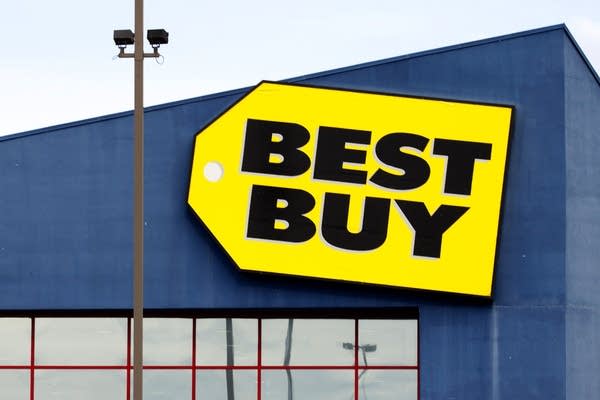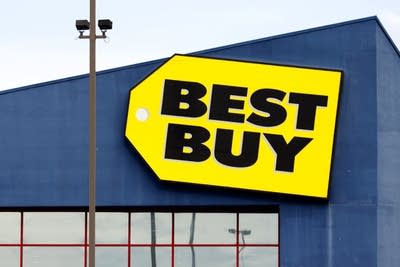Best Buy closing 50 stores, cutting 400 jobs
Go Deeper.
Create an account or log in to save stories.
Like this?
Thanks for liking this story! We have added it to a list of your favorite stories.

Best Buy today announced its cutting jobs and closing stores to help the retailer's bottom line in an increasingly competitive consumer electronics marketplace.
The company will close 50 of its big-box stores and shrink others. Many of the 400 job cuts announced will land at the company's Richfield headquarters, as Best Buy slashes costs by $800 million.
The announcements came as Best Buy reported a net loss of $1.7 billion for the three months ending March 3. The loss was the result of big one-time restructuring and accounting expenses. Without them, the company indicated it would have posted a profit of about $900 million.
Revenue at stores open at least 14 months, a key indicator, slipped 2.4 percent.
Turn Up Your Support
MPR News helps you turn down the noise and build shared understanding. Turn up your support for this public resource and keep trusted journalism accessible to all.
Best Buy has been shrinking its big-box stores and opening more Best Buy Mobile stores, small shops which focus on selling smart phones and related devices. But CEO Brian Dunn said the company's efforts to adjust to market challenges haven't gone far enough.
"We need to move even faster to adapt to the realities of the market and the actions we're announcing today move us boldly in that direction," Dunn said.
Best Buy faces relentless competition from the likes of Amazon.com, Walmart, Target and even manufacturers, such as Apple, that have their own physical and online stores.
Many consumers these days check out products in Best Buy stores only to buy from online merchants that offer lower prices and don't collect sales taxes.
And Best Buy's big-box stores are often proving to be too big. Increasingly, consumers buy movies, music and games in digital formats, not on discs.
In the Twin Cities and San Antonio, Dunn said Best Buy will test new formats for its big stores this year.
"We plan to decrease the big-box square footage in aggregate across the two markets by almost 20 percent from store closures and downsizing of stores. And increase our customer touch points or doors by over 20 percent," Dunn said.
Best Buy will "add doors" by opening more Best Buy Mobile stores. Best Buy has about 300 of them now, and plans to have as many as 800 eventually.
Results of the Twin Cities and San Antonio experiments could influence Best Buy's actions nationwide, in regard to store sizes and closings.
Remodeled big-box stores will feature expanded Geek Squad services, a knowledge desk to assist customers, and enhanced in-store pick-up services for customers who order online. Some test stores will have kitchen and bath centers.
Dunn indicated Best Buy will now offer customers enrolled in its Reward Zone program free shipping, appliance delivery and hook-up. He said the company will also liberalize its return and price-matching policies for those customers.
Best Buy employees will be getting 40 percent more training. And Dunn said they'll work under compensation plans designed to reward performance.
"We will be implementing recognition and reward programs that reinforce the behaviors that deliver great customer experiences," Dunn said.
He did not say whether employees would work on commission.
Wall Street analysts have long said Best Buy needed to be aggressive about closing and downsizing stores.
"It's a nice first step in addressing a lot of the competitive pressures the company is facing," said R.J. Hottovy, a retail analyst with Morningstar. "The big question I have is whether or not it's enough."
Hottovy said Best Buy is still a major player. "They're obviously the largest consumer electronics retailer with about a high-teen percentage of the overall consumer electronics retail market in the U.S. But they have seen market share slip away from them in the past year and-a-half."
A lot of consumer electronics retailers have failed in recent years, including Circuit City and CompUSA. But retail consultant Howard Davidowitz believes Best Buy can survive and thrive, with smaller more productive stores and a stronger online presence.
"They're in a very tough segment, best in class. They're a very rich company. They're loaded with cash," Davidowitz said. "They're not going anywhere. This is a powerhouse company, but [with] a lot of work to do."
Best Buy's news didn't seem to inspire confidence on Wall Street. The company's shares closed down about 7 percent, at $24.77, as the company forecast profits for this fiscal year well below investors' expectation.



